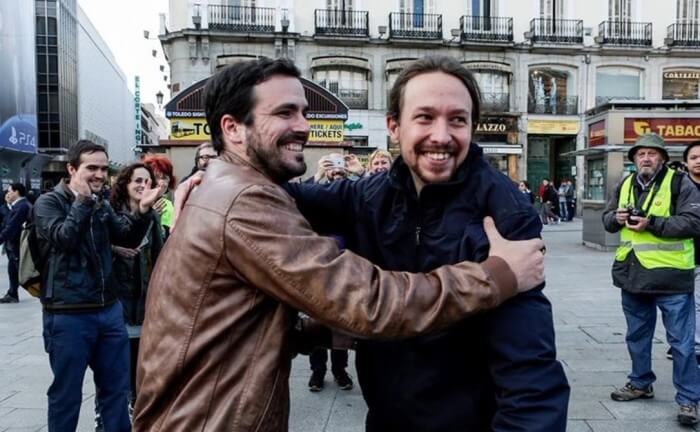By Inaki Irazabalbeitia
Last September 25th Basque and Galician citizens went to the polls to elect their autonomous parliaments. Some political analysts thought that the elections could be a catalyst for change in the Spanish political situation. The outcome was, more or less, what was expected, but it has had unforeseen consequences: a civil war inside the Spanish socialists (PSOE).
Galician voters gave the Popular Party its third consecutive absolute majority: 41 of 75 seats. En Marea, the local allies of Podemos, came second in votes, but won the same number of seats as the socialists: 14 seats each. The BNG, the left nationalist force came fourth with 6 seats. Ciudadanos didn’t make it over the 5% threshold.
It seems hard to understand how a party such as the PP, which has been involved in great corruption scandals and has pursued neoliberal social policies, not to mention its complicity in the loss of civil rights over the last four years, could so easily retain its absolute majority. One has to know the Galician social structure, which could be regarded as colonial. Galicia is a land of emigration, with a rural economy and its industry – such little of it as there is – concentrated in some coastal towns. The young must migrate in search of opportunity. Some decades ago they were unskilled. These days those with education and skills have to go abroad to make a life. Furthermore, the social control exercised by local rulers is very tight in rural Galicia. The Popular Party in Galicia is “The Party”!
Basques normally vote differently and that didn’t change. As in all previous elections to the Basque Parliament, with the exception of that of 1984, the Basque Nationalist Party (PNV) won the majority of both votes and seats. Last Sunday it bettered its performance from four years ago, boosting its seats from 27 to 28 out of 75. Second place went to the left nationalist EHBildu, which overtook Podemos more easily than the polls had predicted. EHBildu won 18 seats and Podemos 11. The Spanish socialists and the PP saw their worst outcome ever, with 9 seats each. As in Galicia, Ciudadanos is out of the parliament.
Some comments:
- The two big Spanish parties continue to lose electoral support. In the Basque Parliament they are in fourth and fifth place. The PSOE has suffered a remarkable collapse. It lost almost half of the seats it obtained in 2012. The situation can be blamed partly on the Basque section of the PSOE (PSE/EE), but the political situation in Spain and the continuous attacks on the General Secretary Pedro Sanchez by some of the regional leaders and mass media, specially, El País, also played a role. The PSE/EE began losing its character and its political identity in 2009 when it made a deal with the Popular Party for the sake of forming a government in the Basque country. They were trapped by the values of the PP and its conceptions of the territorial configuration of Spain and the immutability of the Constitution. Furthermore, the PSE/EE provided institutional support for the PNV whenever the latter needed it. The Spanish immigrants coming to the Basque Country in the 60s and 70s were one of the voting pools for the socialists. As life goes on and new generations arrive on the scene, those pools emptied. Socialists don’t have either a discourse or a political practice to attract new generations. Podemos is their choice.
- Podemos did far worse than in the two previous general elections. It lost half of its votes and passed from first position to the third. The colourless campaign could be blamed for this, and the internal disputes in Madrid. But the real reason is that Basque voters were discriminating enough to be able to vote on the basis of the function of the election. In two previous elections there was a clear objective: to sack Mariano Rajoy from the Moncloa! Voters decided that Podemos was the best way to achieve it. This last election was about who will govern us for the four next years. The PNV’s centrality on the political scene and the party’s image of being good managers exerted a powerful attraction on voters in the regional elections.
- The EHBildu performed better than it did in the last two elections to the Spanish Parliament but it didn’t match the results it achieved in either the 2012 elections to the Basque Parliament or in the 2015 local elections. The disqualification of Arnaldo Otegi, the coalition’s candidate for the presidency, certainly helped EHBildu to turn around the negative trend evident in the two previous elections, attracting a solidarity vote and reactivating social bases that had become distrustful, but I don’t think it was the main reason. The disqualification opened the door to more fresh and transversely networked leading candidates, not saddled with the baggage that Otegi has to carry. The charm of the three women that led the candidacy and the colourful and proposal-filled campaign they conducted could provide a better explanation of the positive outcome.
- The PNV will probably continue governing the Basque Autonomous community. EHBildu and Podemos together could form an alternative to PNV, given that in aggregate they won one seat more. But the PNV should be able to find an ally. The socialists will be the first choice, though the civil war that has broken out in the last days inside the Spanish socialist party has brought some uncertainty. Basque socialists support Pedro Sanchez. Theoretically the Popular Party is a possible option, but it would do the PNV more harm than good. Supporting Rajoy in Madrid comes at too high a price!
And what are the consequences of all this in Spain’s ongoing soap opera?
Rajoy has gained a respite from the PP’s absolute majority in Galicia. The Basque defeat did not come as a surprise.
Sanchez, on the other hand, has lost ground, not primarily because of the bad outcomes – they were a foregone conclusion – but because his internal enemies now think that the time has now come to give him the axe. Fuelled by some regional leaders and the once progressive newspaper ‘El País’, a deluge of declarations and editorial comments is now demanding Sanchez’ resignation and the PSOE’s abstention from the Parliamentary vote for a head of government, which is tantamount to handing the position to Rajoy. Sanchez counterattacked with a call for an extraordinary party congress and a primary process to (re)elect the leader (Monday, 26th). The critics, led by Andalusian president Susana Diaz, reacted with the en bloc resignation of almost half of the board (17 members) on Wednesday 28th. Their aim was to provoke the automatic dissolution of the board, which was controlled by Sanchez, and creation of a provisional committee that would lead the party until the congress. Sanchez called for a Federal board to be established on Saturday, because he thought he had the support of the majority of its members as well as the support of the party members.
Come Saturday a crowd of Sanchez’ fans gathered at the door of the General Headquarters and shouted at the critics as they arrived. A crazy exchange of rumours and counter-rumours continued throughout the day. As information leaked from the assembly, the only point that was clear was that they couldn’t agree even on the purpose of the meeting. When evening came they finally voted on Sanchez’s proposal for an extraordinary congress and primaries. What had at the beginning of the day seemed like certain majority for Sanchez had evaporated and he lost. He had to resign from the leadership and a provisional committee, controlled by the critics, was set up.
If you take into account what happened last week, you could be forgiven for thinking that the crisis is over party leadership. Partially, it is. Susana Diaz wanted to lead the PSOE and Pedro Sanchez and his adamant opposition to Rajoy was an obstacle. He was gaining credibility with public opinion as a leader, shedding his previous image of being a puppet of Diaz.
Ideological factors can also be evoked. Diaz represents the socialists who feel confortable with the right. She has clearly advocated letting Mr Rajoy govern, even with his record of corruption and with the antisocial polices of the Popular Party. Half or so of the regional leaders and former general secretaries of the party, such as Felipe Gonzalez, Joaquin Almunia or Alfredo Perez Rubalcaba are for that position.
Sanchez stated clearly in the latest electoral campaign that he would never support Mr Rajoy as president of the government. He kept saying that he wouldn’t and this was not what Spain’s real power centres wanted to hear.
After last week’s civil war I would not like to predict whether the main fractions of the PSOE will be able to heal their wounds and carry on together. The wounds are deep and it seems a difficult undertaking. The party could split or become irrelevant.
In fratricidal wars of this kind there is never a winner. Susana Diaz won the round, but her political image has been damaged and she has destroyed what little credibility the party had retained.
The PSOE is in a critical position. It had the support of voters in the last elections but it now runs a risk of becoming irrelevant on the national political scene. In some autonomous communities, such as in Catalonia or in the Basque country, the PSOE has reached a PASOK-like situation being the fourth or fifth political force. It could totally pasokize or became a quasi-regional party strong only in communities like Andalusia or Extremadura, where it can keep voters through cronyism.
I think that the defeat of Sanchez is bad news for the Spanish popular classes since it will open the door for Mr Rajoy, but it also shows the strength and the capacity for control that the European elites have over our political system. This is bad news for all Europeans who dream of a more equal and social Europe.











